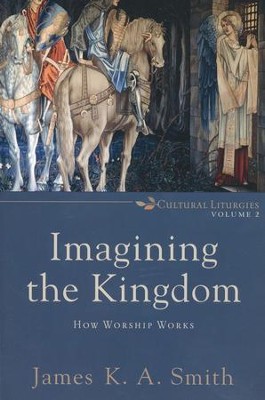This book is a thought-provoking, generative reflection on the imagination-shaping power of Christian worship practices. Smith describes and demonstrates how practices, perceptions, emotions, and thought interact and how together they can be shaped in cruciform ways. What an ideal book for crossing boundaries among academic disciplines and between the academy and the church.
-John D. Witvliet,
Calvin Institute of Christian Worship, Calvin College, and Calvin Theological Seminary
Imagining the Kingdom is a fit successor to Jamie Smith's remarkable Desiring the Kingdom. The new book is, like its predecessor, learned but lively, provocative but warmhearted, a manifesto and a guide. Smith takes Christians deeper into the artistic, imaginative, and practical resources on which we must draw if we wish to renew not only our minds but also our whole beings in Christ.
-Alan Jacobs,
Clyde S. Kilby Chair Professor of English, Wheaton College
In this wonderfully rich and engagingly readable book of 'liturgical anthropology,' Smith makes a persuasive case for the thesis that human beings are best understood as worshiping animals. It has important implications at once for practical theology's reflection on religious formation, liturgy, and pedagogy and for philosophical theorizing about just what religion is. And it develops as an engaging and lively conversation among an astonishing mix of people: imagine Calvin, Proust, Merleau-Ponty, Augustine, Wendell Berry, Bourdieu, and David Foster Wallace all in the same room really talking to each other about being human and how to think about it!
-David Kelsey,
Luther A. Weigle Professor of Theology Emeritus, Yale Divinity School
Jamie Smith shows us that the gospel does not primarily happen between our ears but in all the movements of the body by which we are formed and in turn form the world. I know of no more thorough and sophisticated account of how secular liturgies form and deform us and how Christian liturgies can help. Though sophisticated, Smith's book is also a delight. Its pages are filled with great poetry and insights from films, novels, and everyday life. Smith shows how we encounter God with our whole selves and how God carries us even when we don't know what is going on.
-William T. Cavanaugh,
senior research professor, DePaul University
It is heartening to set one's eyes on Jamie Smith's bold and creative endeavor to awaken Christians, Protestants in particular, to the centrality of worship in even, nay especially, our moral lives. Smith's acute insight into the false and lying stories and liturgies generated by the dominant powers of our economy makes his case for a reclamation of worship within the churches compelling; for this thoughtful book is rightly concerned with a restoration of the Christian imagination rooted in habits of virtue.
-Vigen Guroian,
professor of religious studies, University of Virginia; author of The Melody of Faith


![The Intolerance of Tolerance [Paperback] The Intolerance of Tolerance [Paperback]](http://g.christianbook.com/dg/product/cbd/w185/default.jpg)
